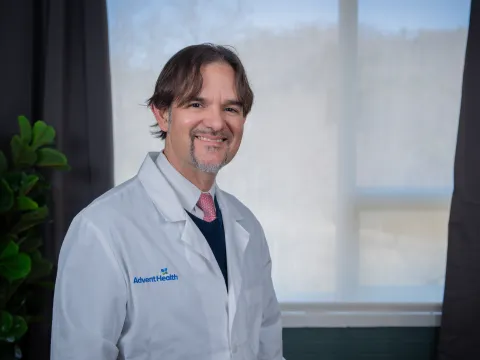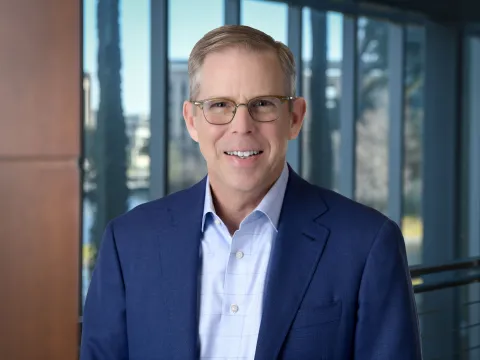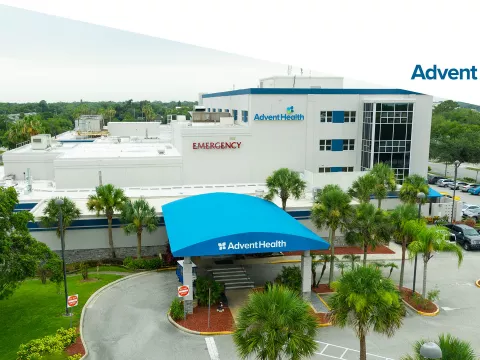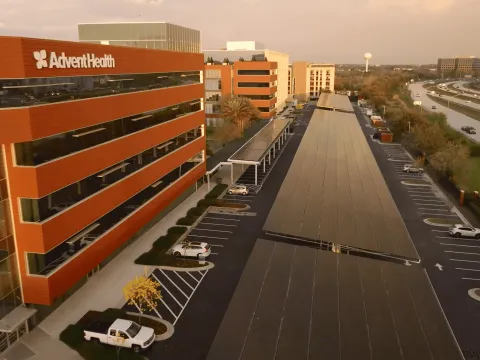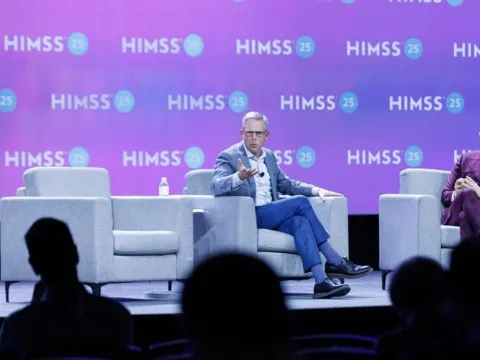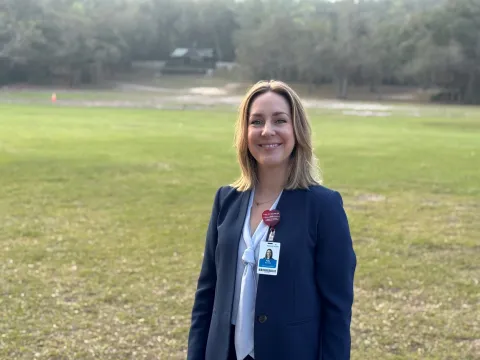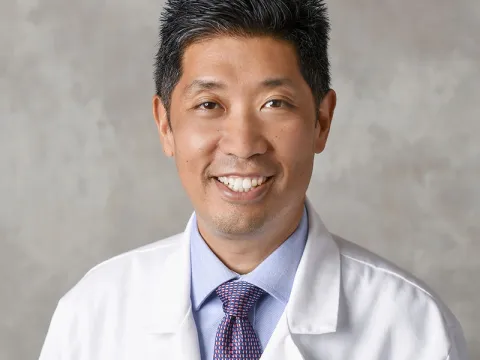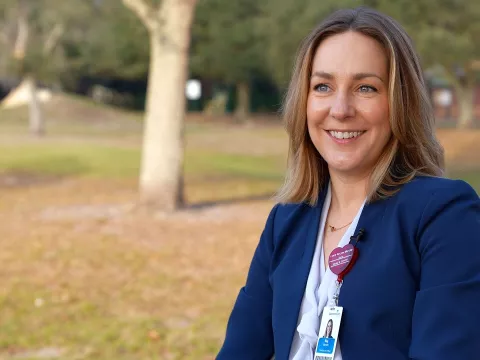- Jose Luis Dieppa
Deep Brain Stimulation - AdventHealth TV Story
At just 35 years old, Carlos Paredes got a stunning diagnosis: He had Parkinson’s disease.
“I did not want to believe that I had Parkinson’s at my age,” he said. “At that time, I was about to get married, and I was ready to start a family. So, it was hard for me.”
Paredes initially noticed tremors in one of his fingers. Over the years the uncontrollable movements spread to all his fingers, and eventually to both arms. The tremors were so severe that he struggled with simple tasks such as drinking from a cup, writing and brushing his teeth.
“My movements increased to the point I could not hold a plate for dinner, I could not play with my daughter or shave,” he said.
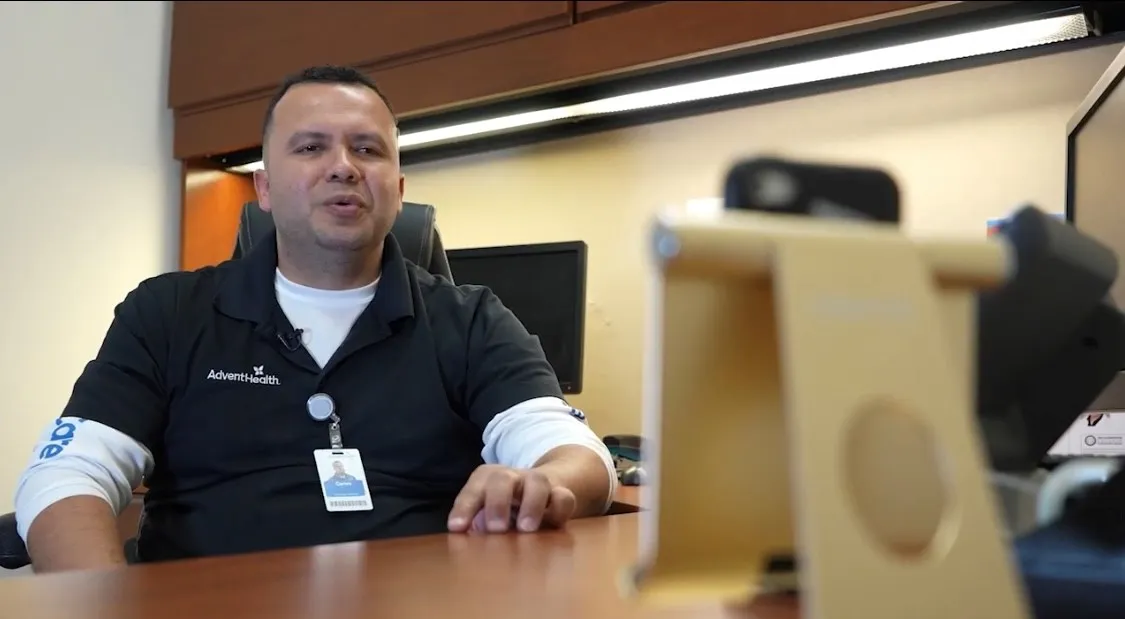
His family advised him to see a neurologist, who diagnosed him with Parkinson’s disease – a progressive condition that causes tremors, slowness and balance issues. After years of taking up to 16 pills daily without much improvement, his mother suggested he see an expert in brain surgery.
In consultation with his medical team, which included neurosurgeon Dr. Chandan Reddy at AdventHealth Celebration and Dr. Mitesh Lotia, movement disorder neurologist and medical director of the movement disorder program at AdventHealth, it was determined that Paredes was an ideal candidate for deep brain stimulation surgery.
“Deep brain stimulation is a procedure where we insert two small wires into either side of the brain. They stimulate a very specific area of the brain to help treat tremors and other symptoms of Parkinson’s disease,” said Dr. Lotia.
By implanting electrodes, doctors can stimulate the specific areas of the brain associated with the unique condition of the patient through electrical impulses that regulate signals, cells and chemicals. A pacemaker-like device is implanted under the skin of the patient’s chest that controls the amount of stimulation the patient receives, and a wire connects the device to the electrodes in the brain. After surgery, visits are frequent in the first several months for therapy management and require in-person visits to ensure the device is working properly and to modify settings when needed.
But thanks to innovative new technology, the adjustments can now be done remotely through the NeuroSphere Virtual Clinic. The process is simple. Using a tablet, Dr. Lotia can observe Paredes’ symptoms and change the stimulation in his brain during a telehealth visit, which can be done from anywhere, such as the patient’s home or workplace. The results can be seen immediately.
“Doing this virtually pretty much serves the same purpose of doing it in clinic,” said Dr. Lotia. “We can provide the same and effective care in the comfort of their home or, as in Carlos’ case, their work.”
"My life has improved 90% because I do not have the movements anymore."
Deep brain stimulation surgery can improve the quality of life of the patient, including returning to hobbies, sports, and other activities. It can also help the patient manage their symptoms as the disease changes or progresses.
For Paredes, the procedure permitted him to return to the things he loves, including his job.
“My life has improved 90% because I do not have the movements anymore. I can play with my daughter, I can do my job normally, I can have a life with my family,” he said.
According to Dr. Lotia, about 15% of patients with Parkinson’s disease in the United States become good candidates for deep brain stimulation surgery. However, it is still a very underutilized service due to many factors such as lack of awareness, delayed referrals and fear of brain surgery.
“I was very scared of the procedure, but I did it for family,” Paredes said. “I hope that people who may have the same condition see my story and get the help they need. If I can help one person, it was all worth it.”
To hear more about Paredes’ journey, watch the video that originally appeared on “AdventHealth TV,” AdventHealth’s internal newscast for Central Florida Division team members.
Recent News
AdventHealth is excited to introduce Eugenio L. Menendez, DO, FACP, to our community of care. He is joining the team at AdventHealth Medical Group Family Medicine at Hendersonville* following the...
The AdventHealth Board of Directors has appointed David Banks as the organization’s new president/CEO, effective immediately.
Ming Wu, MD -- a family medicine doctor with AdventHealth Littleton -- talks about the ways to lessen the impact of seasonal allergies this spring.
Joshua Champion has been named Chief Operating Officer (COO) at AdventHealth New Smyrna Beach. He officially steps into his new role on April 7.
Dr. Tim Hendrix, medical director at AdventHealth Centra Care, debunks common misconceptions about the common cold.
As grocery prices soar, many seek ways to maintain a nutritious diet without breaking the bank. The challenge often lies in effectively managing costs.
AdventHealth’s corporate campus solar energy project is one of the largest privately owned solar projects in Florida.
David Banks, a senior executive at AdventHealth, explains how the right technology doesn't replace human care -- it makes it better.
AdventHealth Celebration is prioritizing nutrition and sustainability through an innovative program at the hospital. Leaders are utilizing a Freight Farm to grow produce.
For Kay Barnett, leadership goes beyond a job title. It’s about presence, perseverance and empowering others along the way.
If you had your shots administered 30 to 40 years ago, are you still safe? News 6 looked for an expert at AdventHealth for the answer.
For Kay Barnett, leadership goes beyond a job title -- it’s about presence, perseverance and empowering others along the way.

